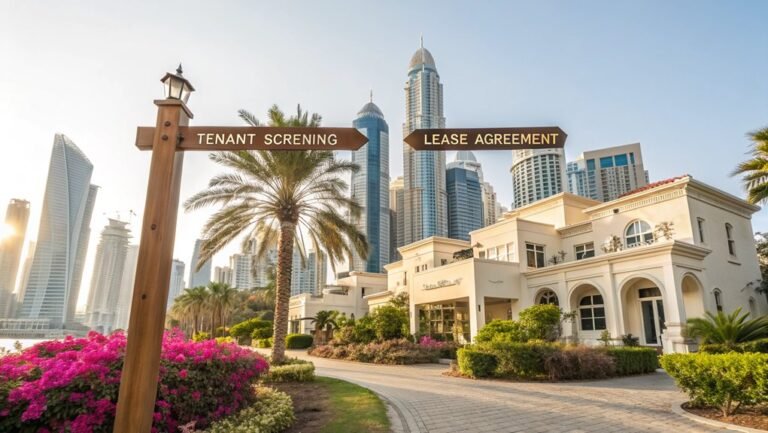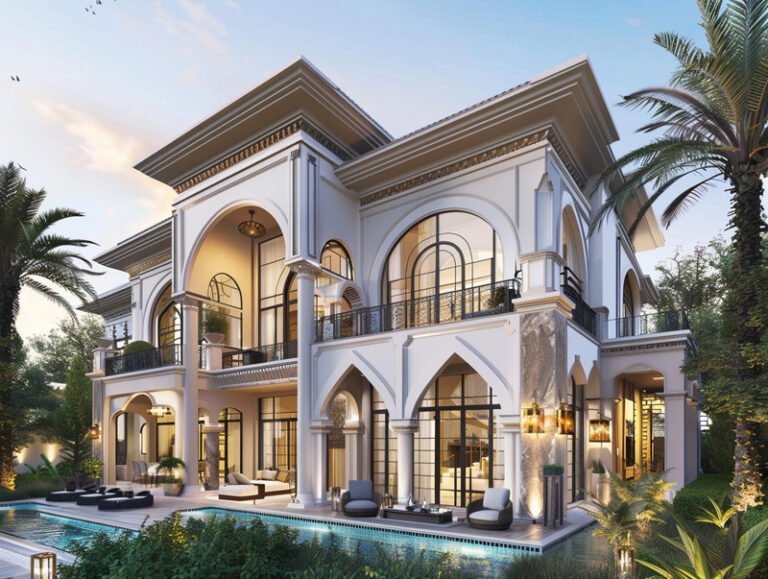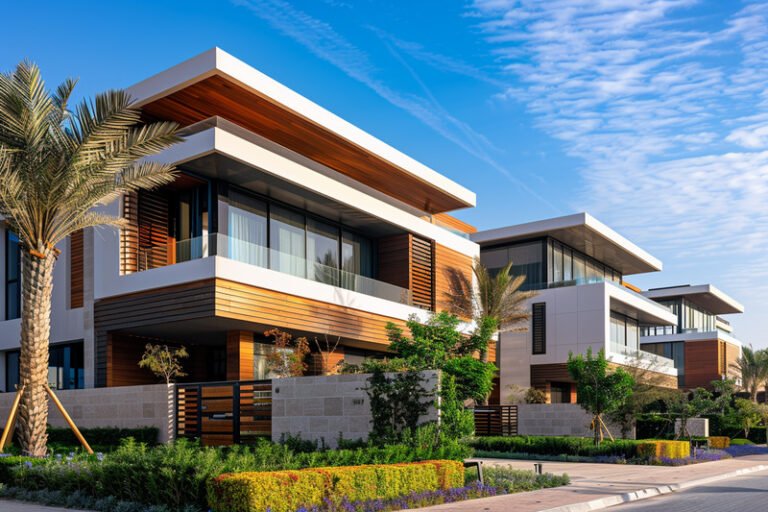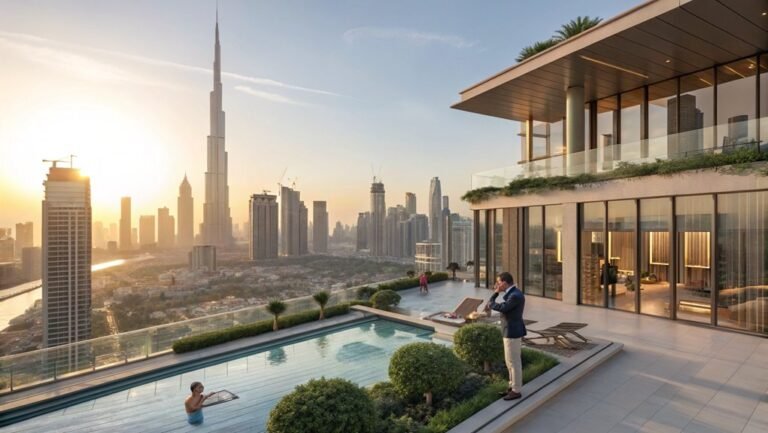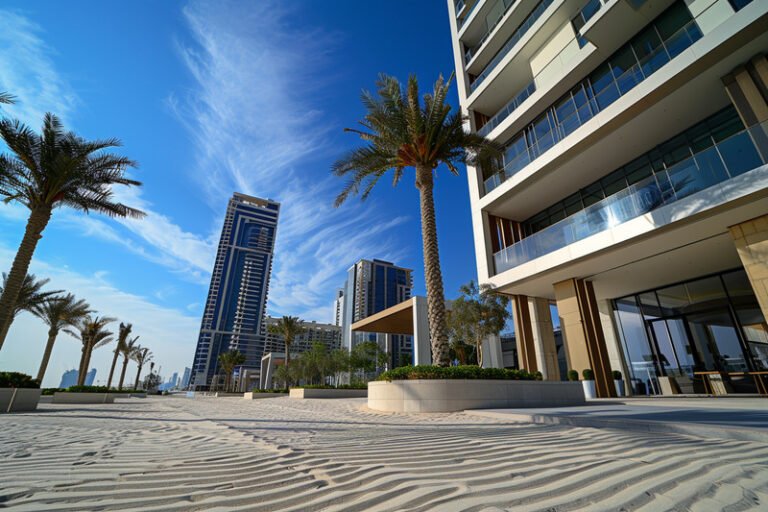Comparison Between Renting and Buying Property in Dubai
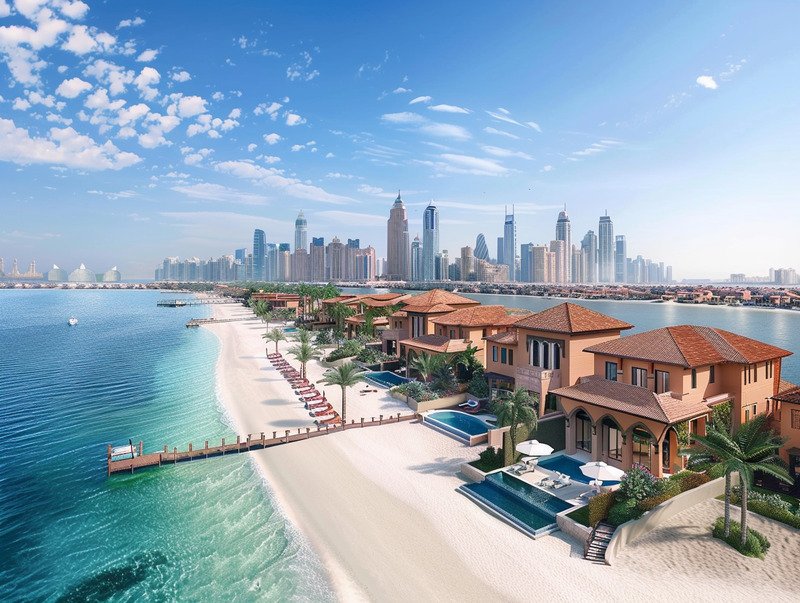
When deciding between renting and buying property in Dubai, several important factors need to be considered. Renting requires less initial investment, while buying involves a substantial financial commitment.
Your lifestyle plays a crucial role; renting offers flexibility and mobility, whereas buying allows you to build equity and potentially earn rental income.
Each option comes with different maintenance responsibilities and legal implications.
How do these aspects align with your financial goals and personal circumstances? Let's explore the details to guide your well-informed choice.
Let us help you find the perfect property. Contact us to get started.
Key Takeaways
Renting in Dubai offers flexibility and easier relocation, making it ideal for those with changing job or personal circumstances. Renters typically have predictable monthly payments and avoid maintenance and repair responsibilities.
Buying property in Dubai allows you to build equity and benefit from the real estate market appreciation. Homeowners can customize and renovate their property, while renters must follow the landlord's rules and restrictions.
Upfront costs for buying include a down payment, Dubai Land Department fees, agent commissions, and mortgage arrangement fees.
Financial Considerations
When deciding whether to rent or buy property in Dubai, financial considerations are crucial. First, evaluate your budget. Buying property requires a substantial upfront investment, including down payments, mortgage fees, and registration costs. Additionally, you must factor in ongoing expenses like maintenance, property taxes, and homeowners association (HOA) fees.
Renting, in contrast, involves a smaller initial outlay. You'll cover a security deposit and possibly a few months of rent in advance. However, you won't be responsible for property taxes or major repairs. Monthly rent payments are often more predictable and can include utilities, making financial planning easier.
Consider the long-term financial commitment. Buying property can be a good investment if market values appreciate, offering potential capital gains. However, it ties up significant capital. Renting offers more liquidity and less risk if the property market declines, but lacks asset appreciation opportunities.
Ultimately, whether renting or buying is more financially viable depends on your specific circumstances, including financial stability, investment goals, and market conditions.
Flexibility and Mobility
Flexibility and mobility are key advantages of renting property in Dubai. Without a long-term commitment, you can easily relocate if your job or personal circumstances change. This is particularly beneficial in a dynamic city like Dubai, where career opportunities and life situations evolve rapidly. Renting allows you to adapt quickly without the burden of selling a property.
Renting provides the freedom to explore different neighborhoods before settling down. If you're new to Dubai, you can experience various areas, amenities, and communities without making a permanent decision. This helps you find a location that suits your lifestyle, whether it's proximity to work, schools, or leisure activities.
Another advantage is the reduced responsibility for property maintenance and repairs. As a renter, you're typically not liable for major repairs or improvements, as these are usually handled by the landlord. This can save you both time and money, allowing you to focus on other priorities.
Long-term Investment
Purchasing property in Dubai serves as a long-term investment with significant financial benefits. Unlike renting, buying allows you to build equity over time, providing a solid return on your investment. Dubai's resilient and growing real estate market makes it an attractive option for securing your financial future.
Here are key benefits of buying property in Dubai:
- Appreciation: Property values in Dubai have historically increased, allowing you to build equity.
- Rental Income: Owning property offers the opportunity to generate rental income, which can cover mortgage payments or provide steady cash flow.
- Tax Benefits: Dubai offers a tax-free environment on property transactions, enhancing your overall returns.
Owning a property also gives you control over your living space, allowing renovations and customizations. As you pay off your mortgage, you build ownership, adding to your net worth. While it requires an initial investment, the long-term financial rewards can be substantial.
Upfront Costs
Purchasing property in Dubai involves significant upfront costs that need careful evaluation. Beyond the property's price, you'll face several initial expenses. The down payment typically ranges from 20% to 25% of the property's value, which can be substantial for high-value properties.
Additionally, there's the Dubai Land Department (DLD) fee, usually 4% of the property's purchase price. This fee is mandatory for property registration.
Agent commissions, often around 2% of the property's value, should also be considered.
If you're financing through a bank, mortgage arrangement fees can range from 0.25% to 1% of the loan amount.
Property valuation and inspection fees may apply to ensure the property meets legal and structural standards.
Legal services are another essential cost. Engaging a lawyer to handle the paperwork and ensure a smooth transaction is advisable, adding to your initial expenses.
Maintenance and Repairs
In Dubai, maintenance and repair responsibilities vary significantly between renting and buying property. When renting, landlords or property management companies handle most maintenance tasks. If an appliance breaks or there's a plumbing issue, you simply contact them for repairs. This saves you time and money, as you avoid the hassle of finding and paying for repair services.
However, when you own a property in Dubai, all maintenance and repair tasks are your responsibility. You'll need to budget for routine maintenance like HVAC servicing and minor repairs. Unexpected issues, such as a leaky roof or electrical problems, also fall on you. This means you either need the skills to handle these repairs yourself or hire professionals, adding to your costs.
Key differences to remember:
- Cost: Renters typically don't pay for repairs, while homeowners must budget for all maintenance costs.
- Convenience: Renters rely on landlords for repairs; homeowners manage their own.
- Control: Homeowners have full control over repairs, unlike renters who follow landlord guidelines.
Legal and Regulatory Factors
Navigating Dubai’s legal and regulatory environment is essential for both renters and buyers. For renters, familiarize yourself with the Dubai Tenancy Law, which governs landlord-tenant relationships. This law ensures your rights and obligations are clear. Ensure your lease agreement is registered with the Ejari system, mandatory for all rental contracts, to avoid disputes and gain legal recognition. If you are a buyer, it is important to be aware of laws and regulations related to property ownership, such as the Dubai Land Department regulations. This includes understanding the transfer of property ownership process and any taxes or fees associated with it. Additionally, for those considering longterm rental agreements, it is essential to understand the implications and legal requirements for such contracts, particularly when it comes to renewals and potential disputes.
If you're buying property, understand the regulations set by the Dubai Land Department (DLD). Foreign nationals can purchase property in designated freehold areas. Registering your property with the DLD is mandatory and involves associated fees. Understanding the mortgage process is also crucial, as Dubai banks have specific criteria for securing a loan.
Both renting and buying require compliance with various legal formalities. Knowing these regulations can save time, money, and potential legal issues.
Consider consulting a legal expert to navigate these complexities effectively and ensure a smooth transaction.
Lifestyle Implications
Living in Dubai, whether renting or buying, significantly impacts your lifestyle. Renting offers flexibility, ideal for short-term stays or jobs requiring frequent relocations. It allows you to choose various locations and property types without long-term financial commitments. Additionally, renting often includes maintenance and repairs, sparing you extra costs.
Buying property in Dubai ties you more permanently to a location and community, fostering stability and belonging. Ownership allows you to personalize and renovate your space to suit your tastes, enhancing your quality of life. It also offers potential financial appreciation over time, though it comes with the responsibilities of property maintenance and mortgage payments.
When considering lifestyle implications, weigh the following:
- Flexibility vs. Stability: Renting provides flexibility; buying offers long-term stability.
- Financial Commitment: Renting involves monthly rent; buying requires a mortgage and maintenance costs.
- Customization: Renters have limited customization options; owners can personalize their property.
Conclusion
When deciding between renting and buying property in Dubai, consider financial factors, flexibility, investment potential, and legal aspects.
Renting offers lower initial costs and greater mobility. Buying lets you build equity and customize your home.
Maintenance and legal regulations are crucial. Evaluate these factors to make an informed choice that fits your lifestyle and financial goals in Dubai.
Let us help you find the perfect property. Contact us to get started.

